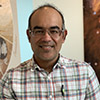Fifty years after that 'one small step' there's a new rush to reach the Moon
 Author:
Author:
Dr Mahesh Anand is a Reader in Planetary Science and Exploration at The Open University.
He co-ordinates the UK-node of the NASA Solar System Exploration Research Virtual Institute.
When Apollo 11 landed on the Moon on 20 July 1969, history was made. Fifty years later, it stands as arguably the greatest achievement of the twentieth century and a testament to human endeavour and perseverance.
Astronauts Neil Armstrong and Buzz Aldrin spent just under twenty-four hours on the Moon, including over two hours of field work at the lunar surface.
Meanwhile, Michael Collins encircled the Moon in the Command Module, perhaps best-positioned to contemplate the meaning of life or our place in the Universe.
Down at the lunar surface, Armstrong and Aldrin performed several experiments, but arguably their most important task was to collect the first ever samples of the Moon.
Apollo 11 returned 22 kg of lunar samples to Earth. It was to be the first time that scientists were able to analyse Moon rocks in Earth-based laboratories and set in motion a series of discoveries that continues to this day.
.jpg) Over the past decade, I have been extremely fortunate to lead several projects working on Apollo samples at The Open University.
Over the past decade, I have been extremely fortunate to lead several projects working on Apollo samples at The Open University.
Thanks to the Apollo astronauts and the curators at NASA, researchers such as myself - who weren’t even born when the Apollo Moon landings took place - are still able to study Moon rocks and feel part of a shared historical adventure.
As the world celebrates the 50th anniversary of Apollo 11 landing on the Moon, The Open University also celebrates its 50th anniversary.
By sheer coincidence, The Open University was awarded its Royal Charter just three months before the first Moon landing, heralding a new era not just in space exploration but also in higher education.
Not surprisingly perhaps, The Open University has championed space research for most of its existence and indeed we are very proud of our continuing leadership in this global endeavour.
Indeed, it has been very exciting to be involved in the theory-changing discovery of water in Moon rocks, which had been thought to be devoid of water for almost four decades since the first samples were analysed in 1969.
Our findings suggest the presence of a water reservoir in the Moon which is similar to certain parts inside the earth’s structure.
Furthermore, the distinctive chemical composition of the water in the lunar samples points towards water in the Moon having a common origin with that of the Earth and asteroids.
Despite these Apollo samples having been collected 50 years ago, this field of research remains active, as many new questions have arisen through recent findings.
Some of these new questions can only be addressed effectively by returning to the Moon with custom-built instruments to perform experiments in-situ, followed by missions returning samples from areas of the Moon that were not visited by the Apollo missions.
New research will explore the possibility of building habitats on the Moon. The availability of water on the Moon will play a vital part in realising our bold ambition of living on the Moon in the not too distant future.
As we look forward to the next fifty years of space exploration, we must acknowledge the contributions countless individuals made towards the success of what was once an unimaginable dream of landing humans on another planetary surface.
Just as the members of the Armstrong clan in Dumfries and Galloway several centuries ago couldn’t know that one of their descendants would be a Moonwalker, we must continue to inspire and engage the future Neil Armstrongs of the world who will realise the dream of extending humanity’s presence to the Moon and beyond in a safe and sustainable manner.
This article was originally published by The Scotsman.
Learn more about the Moon landings on OpenLearn.
Image: Apollo 11 - Aldrin Looks Back at Tranquillity Base. Credit - NASA.
News

Open Outlook - November 2025
Find out more about the latest news and events from The Open University in Scotland with the November 2025 issue of Open Outlook.

OU leads research on Scotland’s Fair Access landscape
OU researchers have been appointed to create a comprehensive picture of current university access and participation activity across Scotland.
Media contacts
Media enquiries
OU in Scotland Media Relations:
Call 0131 549 7932
OU UK Press Office:
Call 01908 654316
Out-of-hours:
07901 515 891
Visit our OU UK news site
Newsletter
Sign up for our quarterly e-newsletter, Open Outlook.